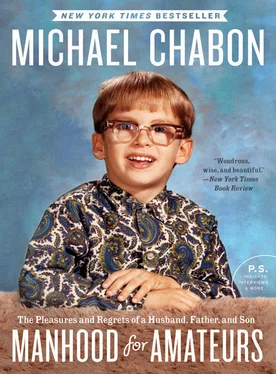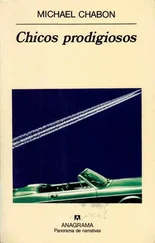On this one Saturday morning, the Megginsons were all about Planet of the Apes . Not the movie nor any of its five increasingly baroque sequels, and certainly not the Pierre Boulle novel, confusingly replete with witty Frenchmen. No, the Megginsons and I were obsessed with the short-lived CBS television series, of which thirteen episodes aired, to low ratings, at the end of 1974.
As with many forgotten TV series, all the episodes of Planet of the Apes are now available on DVD, but I haven’t ever gone back to look at them. What I remember about the show, albeit vaguely, are the elements that formed the basis of our play: the setting amid a world of forests and grassy hills; the peculiarity that, unlike in the films, the humans, though degraded in ape eyes, were capable of speech; and above all, perhaps, the steady presence in every episode of adventure on horseback.
For a day we inhabited our Planet of the Apes: a hill, a stream, a small wooden bridge behind the Megginsons’ disorderly and productive town house at the ragged edge of Columbia, where built land gave way to open space. According to principles implied but never articulated by the TV show, we named and fitted ourselves with weapons and histories. I can’t quite remember who was a sensitive chimpanzee, who a questing astronaut, who a noble savage, who a brutal and potent gorilla warlord, but I know that nobody wanted to be one of the characters from the show. It was always part of the game to make up your own character. Maybe we all wanted to be astronauts and left the marauding and enslaving gorillas to be played by the heavies of our imaginations. I am sure that at least as much time was spent in preparing to play, in conferring and arguing and revising the parameters of the game, as in actually playing it. Eventually, night fell; it was time to come inside, time for me to return to my own neater, more secure, vastly emptier house.
And now I have four children of my own, two girls and two boys. There is a lot going on in my house, and sometimes it seems to echo or reflect the fertile chaos in the Megginsons’. But somehow it is not quite the same. I’m not sure what the reason for that is. We don’t let things get as messy around here. My kids have a lot more homework than I ever did. But there’s something lacking in their lives, and I see it in their relation to the variety of crap that now dominates the mass-art landscape, a variety well represented by neurotic-farting-penguin movies.
There’s no doubt that the Planet of the Apes TV show was crap. Yes, the makeup was decent for its time, and the shows tried, in the dutiful manner of early seventies post— Star Trek , pre— Star Wars television science fiction, to address weighty issues of prejudice, intolerance, and the meaning of being human. But it remained — indeed its existence depended on it being — a knockoff of a knockoff, the sequel to sequels, worked up by veteran TV hacks to fill up the spaces between Parkay margarine ads. What’s more, it was crap that flopped, canceled after only three months.
But it had — crucially, to my theory of what makes great mass art — the powerful quality of being open-ended, vague at its borders. Onto its simple template of horses and apes and humans, of quest and pursuit across a simplified landscape, a kid could easily project himself and the world he lived in. In its very incompleteness, born of lack of budget, the loose picaresque structure, and even of cancellation itself, it hinted at things beyond its own borders. There was room for you and your imagination in the narrative map of the show.
The CGI animated movies that dominate in the theaters today don’t work that way. With their fixed sets of characters, each giraffe or squirrel resembling in its carefully designed variation not a recognizable person or type so much as a brand identity, these films operate more like classic sitcoms than like the parodic-adventure stories for which they try to pass. The contours of the worlds they depict feel as backless as painted scenery flats, as the walls and doors of Mary Richards’s newsroom or the Huxtable living room. I like a good sitcom as much as anybody, but did any kids ever try to get up a game of Murphy Brown? At the same time, the ample budgets, large crews, and generally high level of technical prowess boasted by even the most execrable of these films enable their creators to employ the prevailing Star Wars —inspired aesthetic of packing every scene, every frame, with incident and filigree, without the concomitant open-ended structure that made the early Star Wars films, at least, a likely locus of fantasy play both for children and, in the form of fan fiction, adults. The new studio-made CGI products are like unctuous butlers of the imagination, ready to serve every need or desire as it arises; they don’t leave anything implied, unstated, incomplete. There is no room in them for children. And so they never form the basis for my own kids’ games.
As a father raised on a hearty diet of crap, I wrestle all the time with the role of crap in my own kids’ lives. There is so damn much of it now — crap TV shows, crap movies, crap toys and crap trading cards, crap video games, crap Flash animations and crap macaroni and cheese with SpongeBob-shaped pasta nodules, all of it interlocked and cross-referenced with breathtaking care and thoroughness. But I wouldn’t worry about it so much, I guess, if I felt like my kids had the space in their own heads and, especially, in their own physical worlds to lay it all out and make it their own.
Sometimes they don’t seem able to operate in an imaginative world. When we go to Maine in the summer my wife and I open the back door and step aside and wait for them to fly out into the grass and the sunshine. Acres of woods and wildflowers, butterflies and streams, a tame waterfall. A waterfall and hours of freedom from rules and parental control. And they stand there on the doorstep, eyeing one another, shuffling from foot to foot.
In The Omnivore’s Dilemma Michael Pollan describes the disillusioning reality of the life of chickens sold as “free-range.” He explains that these birds are raised, like all commercially farmed chicken, in the dense confinement of industrial henhouses for the first six weeks of their lives. At the end of that period, not long before the chickens are to be slaughtered, the doors of the henhouse are rolled open, giving onto a regulation patch of open range. The chickens come to the door and look out at the world of green grass and grubworms and fresh air they are being offered. And then they go back to the cramped, safe remainder of their lives, with their needs and desires attended to as assiduously as by any butler or animation studio. They are afraid to go outside; it’s not a world they know or know how to explore. The farmers don’t really want them to go out and explore it; there are too many diseases they might catch, unprotected by antibiotics as they are.
My kids are free-range children, in all the stark reality of the term except the part about being eaten. If, like the four Pevensie children (two boys and two girls) of The Lion, the Witch and the Wardrobe , they were sent off to the countryside to avoid the Blitz, my children might well have to be marched, under protest, to the room with the old wardrobe and shoved in among the coats; it would be hard for them to grasp how an entire old house, filled with unknown rooms and corridors, might become a world of unlimited play. They might never be able to engage in the half-bored, half-enchanted wandering through the variable, never-changing spectacle of the neighborhood that enables the children (three boys and a girl) in Edward Eager’s Half Magic to find the talisman that grants half of every wish, so that one must learn, invaluably, to wish twice as hard.
Читать дальше
Конец ознакомительного отрывка
Купить книгу












